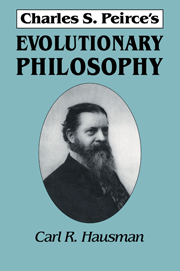3 - THE CATEGORIES AND THE PHENOMENOLOGY
Published online by Cambridge University Press: 07 January 2010
Summary
The Nature and Function of Philosophical Categories
It should not be necessary to launch a lengthy general discussion of the nature and functions of categories in philosophy in order to give an account of what they are and the role they play in Peirce's thought. However, some comments about categories in general are necessary. Briefly, and most generally, categories in philosophy are fundamental conceptions, in the sense that they are conditions of intelligibility. Such conceptions may be regarded as the classes or types of things into which things that are and can be known can be divided. Or they may be considered to be the ways or conditions according to which things can be distinguished and accordingly known. Some things can be made intelligible because they can be located in space and time – as substances that serve as referents for subjects in sentences or propositions. These belong to the category of substance. Some things can be made intelligible because they can be determined to be contingent (Abraham Lincoln's beard, which may or may not be shaved off), whereas others are regarded as necessary (2 + 2 = 4 in a number system based on 10). These belong to the category of modality, which includes contingency, possibility, and necessity. Fundamental classes or conditions of intelligibility are not unlimited in number. They are necessary for identifying, classifying, and relating what may be an unlimited number of things in the universe (or universes of discourse) encountered in any and all domains of experience, including the domain proper to science and that which is available to common sense. However, one may distinguish what Peirce called a “long list” and a “short list” of categories. Aristotle's categories belong to the long list.
- Type
- Chapter
- Information
- Charles S. Peirce's Evolutionary Philosophy , pp. 94 - 139Publisher: Cambridge University PressPrint publication year: 1993



